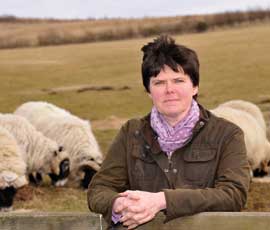OPINION: Elizabeth Elder finds spirit of resilience in face of crisis

We’re the lucky ones. We haven’t lost 40% of our flock in the snow or had sheds collapsing on our cattle. But this has been the grimmest winter we have had in 19 years on our farm. Everyone knows hill farming is tough, but this year hill farmers have taken a kicking.
It started off with not having much fodder because of the rain last year and what we had was poor quality as it was made late. Then the winter weather alternated between rain and snow. The sheep were thin and needed extra feed, but feed was expensive. We kept too many old ewes and we have been found out. There is too much death.
The scenery is as shell-shocked as the occupants, with the whole area a study in sepia, like those old photographs of rural life in the depression. Grass, trees, hedges, heather, rushes, mud, muck, molehills, everything. The landscape is 50 shades of brown.
As they start to lamb, the ewes drop their lambs and wander away. If you don’t get to them quickly they get cold and weak and become a target for the crows or foxes. Meanwhile, you spend all day trailing about in the bone-chilling cold. You’re physically exhausted but you don’t sleep properly at night because of the worry.
There isn’t the slightest chance that the lamb cheque will exceed the feed costs for this winter. That’s even before overheads or labour costs. Being a hill farmer is like being a permanent intern – long on experience and short on cash.
The aim is simply to get through lambing and live to fight another day. Our troubles are down to the weather and it’s nobody’s fault.
In the face of all this, a spirit of resilience is re-emerging. Everyone is aware that there is always someone worse off than themselves, even locally. In this regard, the fallen stock collectors and feed merchants have been doing their best to make people feel better. Each driver tells you that the pile of carcasses or the requirement for extra feed was much bigger at the other farms.
It is also useful to remember lessons from the past. The ewe lambs which survived our previous worst winter went on to be an exceptionally strong group of breeding ewes, having been bred from the hardiest stock.
Being a hill farmer is like being a permanent intern – long on experience and short on cash
I have no doubt that most people will want to continue. Hill farmers feel a compulsion to do it because they love living on the hills and producing high-quality livestock. It’s a calling. So it hasn’t so much been the resilience of hill farmers that has surprised me, I expected that. Rather, it was how close that resilience has come to cracking this time. Farmers can take the odd bad year, but if this weather pattern becomes a trend, the balance would change.
This winter has also re-emphasised the importance of environmental and agricultural subsidies in underpinning upland farming. While the argument for CAP reform is unanswerable, the truth is that without subsidy upland livestock farming would be dead.
We depend on public money, but it is not clear that the public understands what we do or approves of it, so this crisis represents a key moment. It is essential that we and our representatives explain what’s happening and why upland livestock farmers, people dedicated to animal husbandry and the protection of the upland environment, working in the harshest of conditions and for little reward, deserve their respect and support.
In the future those of us who keep going – and we would very much like to count ourselves in that category – will most definitely need that.
Elizabeth Elder and her husband Jake run sheep and cattle on 235ha of hill ground on the Otterburn Firing Range in Northumberland.
What do you think about the crisis in the hills? Have your say on our website forums.
Read more from all our Opinion writers
